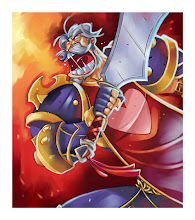The history of Bacon's Rebellion is one that has two clear points of view. One paints Nathaniel Bacon (for which the rebellion was later named) as a hero of the people, a man who was willing to leave his comfortable plantation in order to fight against a government which he saw as unjust towards its people. The other view points to Bacon's darker motives, those of slaughtering the Native Americans who lived near the frontier of the English owned land in America.The article titled 'Whether They Be Friends or Foes.' The Roles and Reactions of Tributary Native Groups Caught in Colonial Conflicts, written by Michael J. Puglisi of Marian College, is evidence of the latter point of view, pointing out that Bacon, "arose to lead an extra-legal band of over 500 men, without commission". The former view point is exemplified in this quote from Howard Zinn's A Young People's History of the United States: Volume One; Columbus to the Spanish-American War, "The frontiersmen felt that the colonial government had let them down. They were angry, and they weren't the only ones. Times were hard. Many Virginians scraped out a living in poverty or worked as servants in terrible conditions. In 1676, these unhappy Virginians found a leader in Nathaniel Bacon."
In continuence with the former point of view of Bacon's motives for rebelling, an article titled The History of Bacon's and Ingram's Rebellion, 1676 shows what many of the frontiersmen thought of the native Americans, with the author saying, "For in a very short time [in January 1676, the Susquehannahs] had, in a most inhumane maner, murthered no less than60 innocent people, no ways guilty of any actuall injury don to these disarning, brutish heathen...". One might counter this argument with several other accounts by witnesses or investigators, numbering those killed by the Indians to be 36, many of whom did in fact provoke the natives attack by attempting to cheat them in trading. The latter hypothesis as to Bacon's motives is shown in this quote from A True Narrative of the Late Rebellion in Virginia, written by the Royal Commissioners sent by the King to investigate the Rebellion, "[Sometime in April 1676]...Bacon had got over the River with his Forces and hastening away into the woods, went directly and fell upon the Indians and killed some of them [which] were some of our best friends...". This shows that many of the natives that Bacon decided to slaughter were in fact allies of the colonists, and were totally innocent of any wrong doings by other tribes. Unfortunately, this was not overly uncommon, as many of the people of Virginia and other colonies did not see any significant differences between the various Native American tribes.
Wednesday, October 8, 2008
Subscribe to:
Post Comments (Atom)


1 comment:
I should have added better transitions between my quotes and information, as well as added 1 or 2 more quotes to strengthen my evidence on both sides of the issue.
Post a Comment